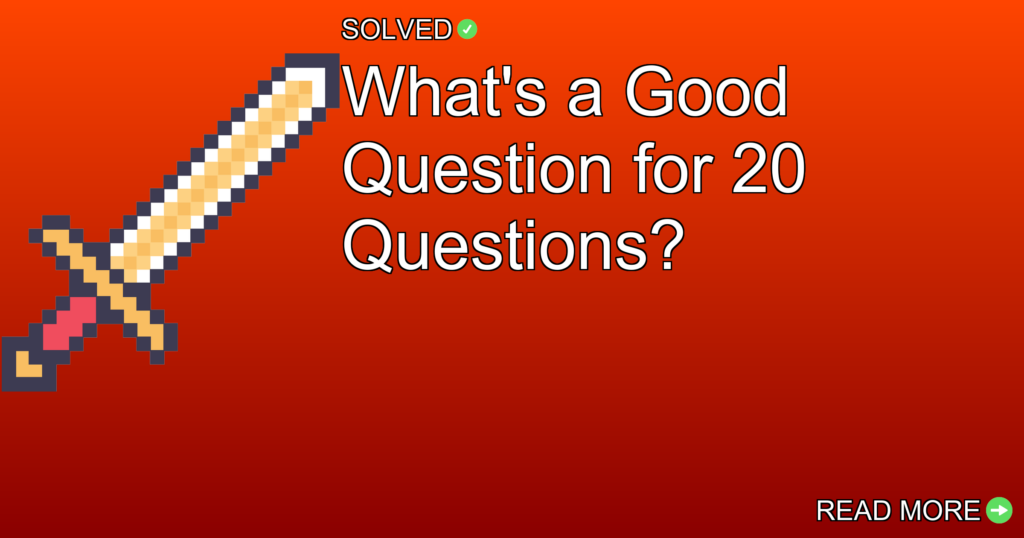– Engaging questions: The best questions are those that lead to fun and insightful discussions.
– Variety matters: Including different types of questions (personal, hypothetical, flirty) can keep the game exciting.
– Strategic questioning: Asking questions that split possibilities in half is key to winning the game.
Introduction
The classic game of 20 Questions has been a staple of road trips, parties, and casual gatherings for generations. With the rise of digital communication, it’s now common to play this game over messaging apps like iMessage. But what makes a good question for 20 Questions? In this article, we’ll explore some engaging examples and strategies to make your next game unforgettable.
What Makes a Good Question?
A good question in 20 Questions does more than fill time; it engages the other player and keeps the conversation flowing. Whether you’re playing with friends, family, or someone you’re trying to get to know better, here are some qualities of a great question:
Personal Insight
Questions that look into personal experiences or preferences can reveal fascinating information about your fellow players. For instance:
- “Have you ever dine and dashed at a restaurant?”
- “Would you rather have endless money or endless love?”
- “What is your most frequently used emoji?”
These types of questions are not only fun but also help you learn more about the people you’re playing with.
Hypothetical Scenarios
Hypothetical questions allow players to imagine scenarios and make choices based on their values or desires:
- “If you could star in a movie, what movie would it be?”
- “Would you rather be able to fly or be invisible?”
Such questions often lead to lively discussions and imaginative answers.
Flirty Questions
When playing with someone you’re interested in romantically, flirty questions can add an extra layer of excitement:
- “Do you believe in love at first sight?”
- “What was your first kiss like?”
- “What’s your idea of a perfect date?”
These questions can help break the ice and build a deeper connection.
Strategic Questioning
Winning at 20 Questions isn’t just about asking fun queries; it’s also about strategy. The goal is to identify the secret object within 20 yes-or-no questions. Mathematically, each question should ideally eliminate half of the remaining possibilities. Here’s how:
def strategic_questioning(objects):
# Assume objects is a list of possible items
mid = len(objects) // 2
question = f"Is it {objects[mid]}?"
return question
In practice, begin by asking broad questions that narrow down categories before getting into specifics.
Best Objects for 20 Questions
Choosing an object that’s neither too obvious nor too obscure is important for maintaining everyone’s interest. Here are some ideas:
- Animals: Dog, Elephant, Dolphin
- Famous People: Albert Einstein, Beyoncé
- Food Items: Pizza, Sushi
- Classroom Objects: Chalkboard, Globe
The key is to pick something that offers enough clues for players to guess but isn’t immediately apparent.
How to Play with Different Audiences
Playing with Friends
When playing with friends, feel free to mix personal and hypothetical questions:
- Have you ever been in a car crash — and it was your fault?
- If you could travel anywhere right now, where would you go?
- What’s your favorite childhood memory?
Playing with Your Crush
If you’re playing with someone special, incorporate flirty and personal questions:
- What was your first impression of me?
- What’s your idea of a perfect date?
- What was your best kiss like?
Playing Digitally on iMessage
Playing over iMessage involves typing out each question and answer. Make sure your questions are clear and concise:
- Do you prefer cats or dogs?
- Have you ever stolen something small?
- Is blue your favorite color?
Conclusion
Crafting good questions for 20 Questions involves balancing personal insight, hypothetical scenarios, and strategic questioning. Whether you’re aiming to win the game or foster deeper connections with friends or crushes, these guidelines will help keep the conversation lively and engaging.
Experiment with different types of questions and see what works best for your group. Happy questioning!
By following these tips and examples, you’ll be well-prepared for an exciting round of 20 Questions on iMessage or any other platform.
This comprehensive guide aims to make your experience playing 20 Questions as enjoyable as possible while offering practical advice on how to ask compelling questions that keep everyone entertained.



